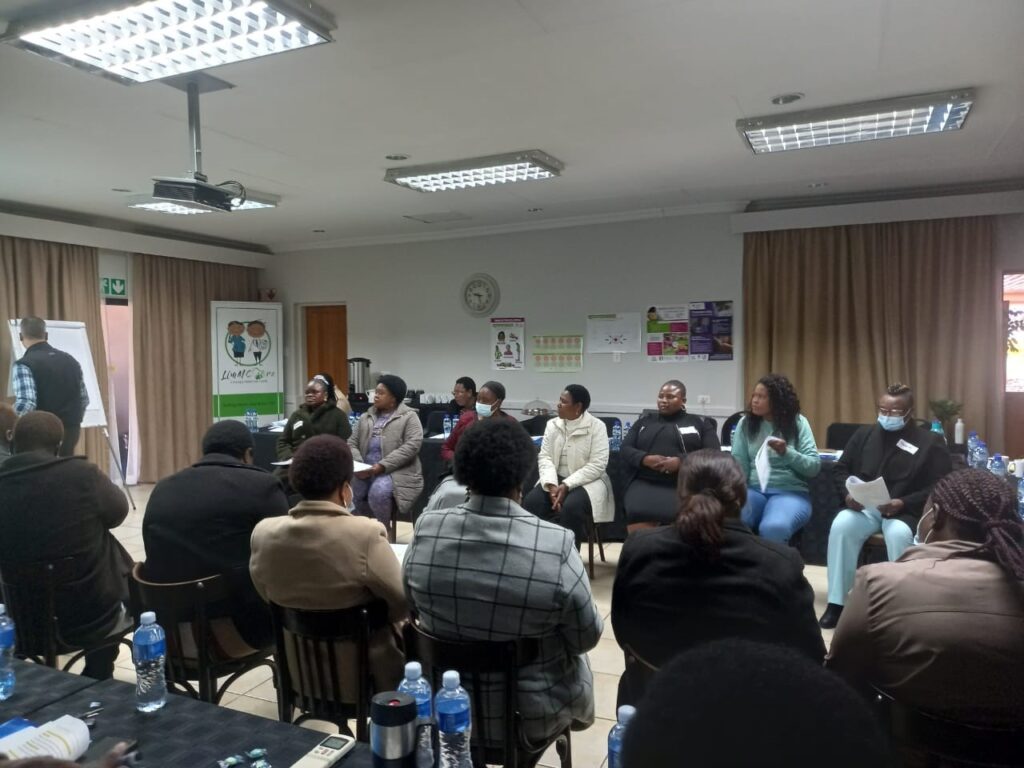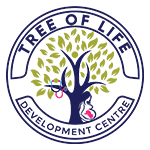Limpopo
Maternal Care
(LimMCARE)
LimMCARE supports mothers during pregnancy, labour, birth and postpartum, and competent healthcare workers and quality and comprehensive care at every visit.
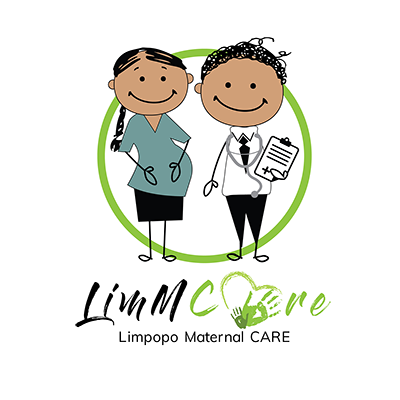
Background
The public sector maternity units have gained a reputation for being non-caring and adopting practices that violate women’s human rights during labour and birth. There is a growing movement both globally and nationally to re-instil the basic principles of medical and nursing care that are rooted in respecting clients’ dignity, especially pregnant women. LimMCARE is rooted within the global Respectful Maternity Care (RMC) movement, which promotes pain relief during labour, Better Birthing Initiative practices, competent birth companions to support mothers during pregnancy, labour, birth and postpartum, competent healthcare workers and quality and comprehensive care at every visit.
Respectful Maternity Care
The World Health Organisation (WHO), in its 2018 Recommendation: Intrapartum Care for Positive Child Birth Experience, defines RMC as care organised for and provided to all women in a manner that maintains their dignity, privacy and confidentiality, ensures freedom from harm and mistreatment, and enables informed choice and continuous support during labour and childbirth. The recommendations must be implemented in a care package in all facility settings to ensure that high-quality care and better experience care are jointly achieved.
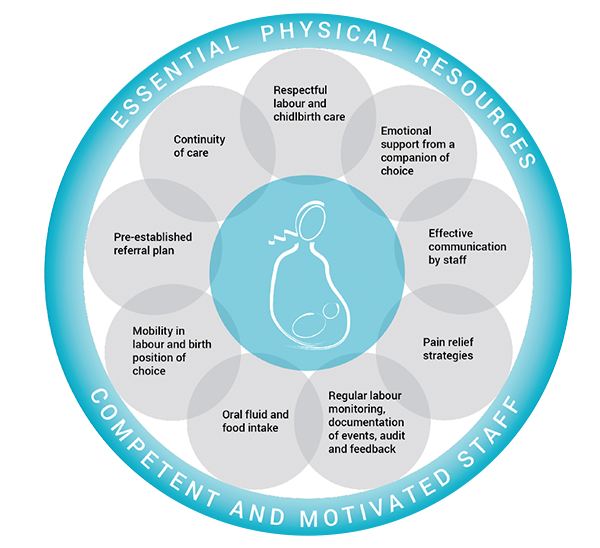
BIRTH COMPANIONSHIP
There is a plethora of evidence that having a birth companion or Doula during pregnancy and labour significantly improves the birth outcomes for both mother and baby. The Doula concept is new to Limpopo and will require much sensitisation of healthcare providers and communities to be successfully implemented, especially considering that Doulas work for a fee.
It was opted that birth companionship be initiated as a prerequisite to implementing a Doula project. Standard Operating Procedure (SoP) has been developed to guide the integration of Birth Companions into the health care system in Limpopo. Facilities are mentored and supported to encourage women to use birth companions during labour and childbirth.
The birth companions are orientated and equipped with birth companion skills as part of the antenatal education programme (birth companions are required to attend as many antenatal education classes with the mothers). Labour wards are also equipped with essential tools that birth companions can use, which have proved effective for non-pharmacological pain relief to support mothers, e.g. birthing balls, heat packs, cold packs, massages, posters, etc.
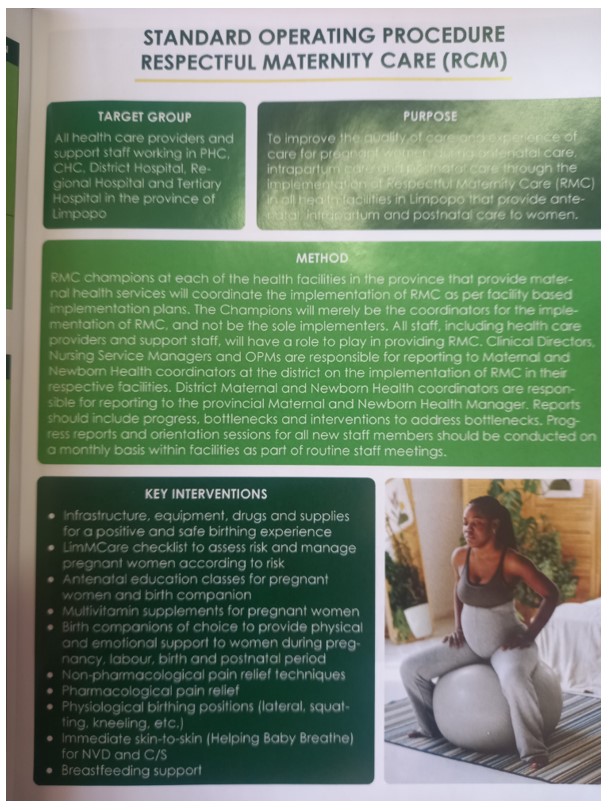
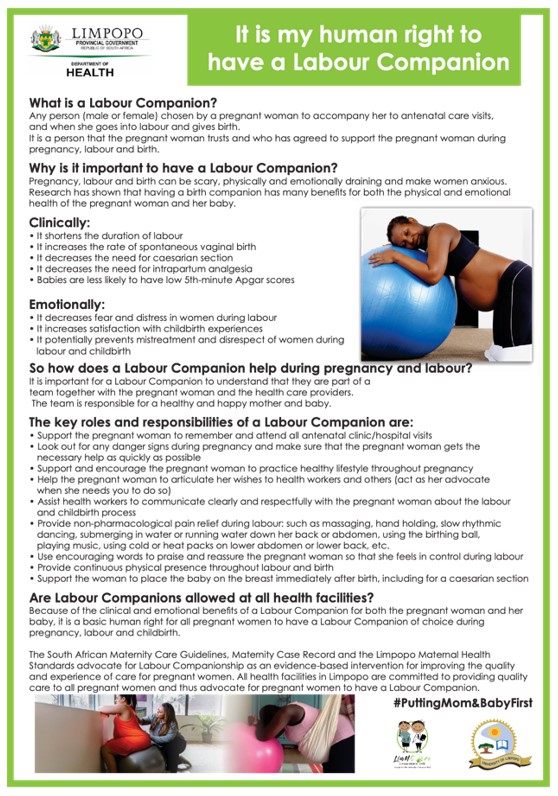
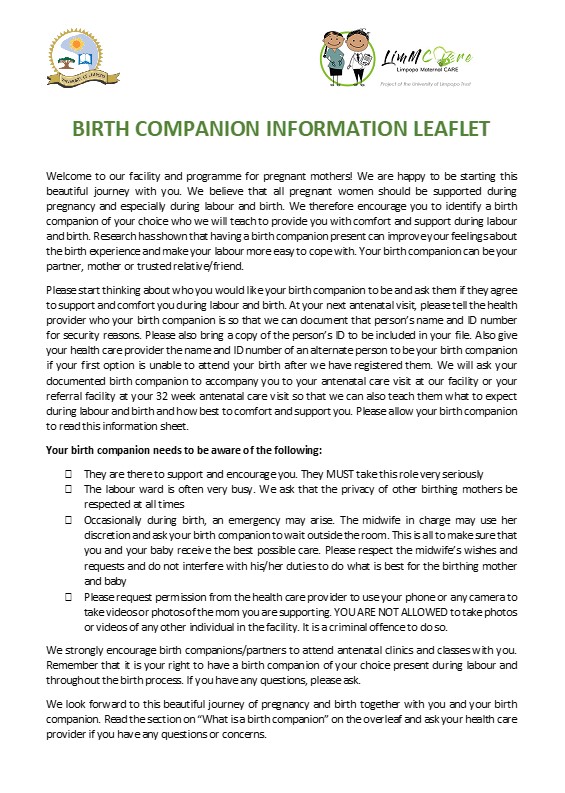
ANTENATAL CARE AND EDUCATION
Pregnant women in the public health sector have limited access to pertinent information about pregnancy, labour, birth and postnatal care, a key driver of poor maternal and newborn health outcomes. We have developed an antenatal education programme (also referred to as antenatal classes in the public sector) (insert link), which covers critical topics such as what to expect during pregnancy and delivery (including danger signs and what to do), pain relief during labour and post-delivery; breastfeeding; nutrition, baby care and parenting. The programme will be implemented at all primary health care facilities as part of the antenatal care package.
A facility-based multidisciplinary team at each facility, comprising topic/content experts such as nutritionist/dietician, physiotherapist, midwife, obstetrician, and community health workers, will collectively implement the programme, led by a midwife. Relevant videos/DVDs are being sourced and screened to reinforce health messages. Materials (including flipcharts, manuals and posters) have been developed and printed for every facility that implements the antenatal education programme.
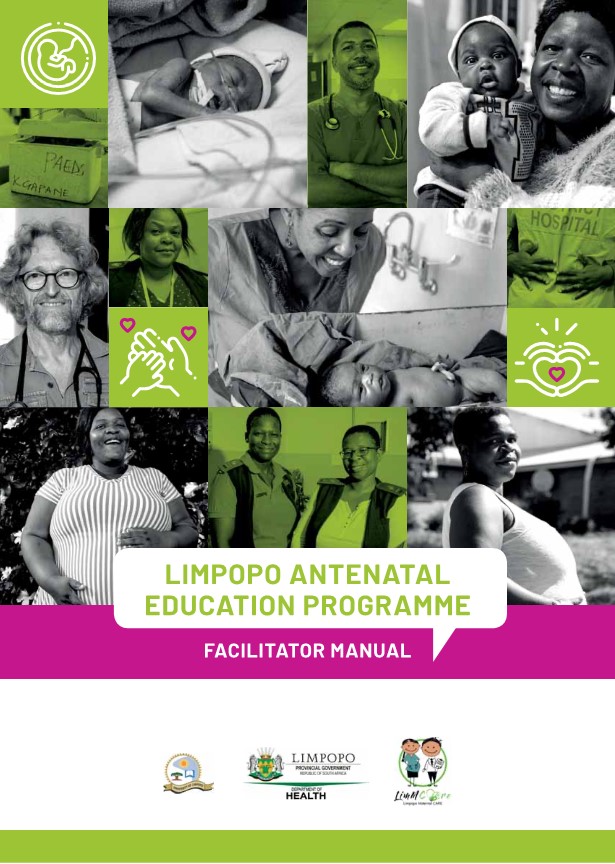

LimMCARE CHECKLIST (BANC plus plus)
Antenatal care (ANC) is the healthcare and support received whilst pregnant to ensure optimal well-being for the mother and unborn baby throughout pregnancy. All women must be offered the best healthcare by skilled professionals throughout pregnancy. Limpopo is challenged with over-flooding high-risk antenatal care clinics with low-risk clients.
LimMCARE Limpopo has reviewed the Guidelines for Maternity Care in South Africa and has identified criteria for referring patients to a doctor so that patients are appropriately referred. This will reduce high-risk patients not being assessed by a specialist and reduce patients with uncomplicated pregnancies being transferred to the high-risk clinic, thus decongesting the high-risk clinic. The strategy is being applied in the pilot site and yielding positive results.
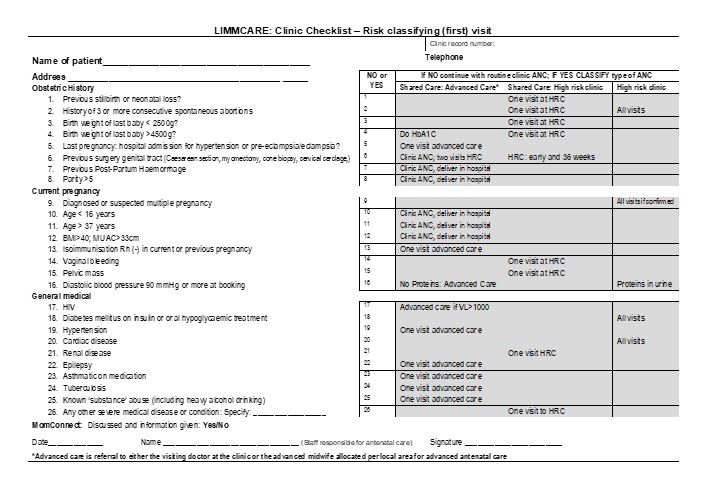
PROGRESS TO DATE AND MONITORING MATERNAL HEALTH OUTCOMES
During the implementation of the LimMCARE pilot (2018 – 2020) in the Greater Letaba sub-district, Mopani District, the following was achieved:
- RMC champions were identified in each of the 22 facilities (Kgapane Hospital and its 21 feeder primary healthcare facilities to be the liaison in each facility, champion and lead RMC implementation together with their OPM
- The identified champions were trained, mentored and supported by the RMC experts, i.e., Mr Jason Marcus from UCT and Ms Maphei Moshabela, the retired Limpopo provincial maternal health manager, in addition to the project team.
- The champions and their co-workers were trained in facilitating the antenatal education classes for mothers and their birth companions to prepare them for pregnancy, labour, birth and care for the newborn. Antenatal education classes were conducted in all facilities using the provided antenatal education classes toolkits. A video with an RMC champion, Sr Manyama from Shotong Clinic was produced to educate other healthcare workers on how to run and interactive antenatal education class and was also shared on social media to give the community a more indepth understanding of what being a birth companion entails – See Video
- A series of learning sessions were held quarterly in 2018 and 2019, together with representation from the other hospitals in Mopani and the district management, so that they could learn from the implementation and, in turn, implement these in their facilities.
- An electronic survey for mothers to rate their experience of care was introduced and used to get feedback from mothers on their experience during labour and birth as well as whether facilities informed them about birth companionship.
- A merit system for RMC implementation was introduced and two awards ceremonies were held in 2019 in an effort to care for the carer (improve their mental health) as well as appreciate the efforts done in facilities. https://www.facebook.com/joy.summerton.5/posts/10215702754387153 and https://www.lincare.co.za/greater-letaba-respectful-maternity-care-rmc-advocates-celebrating-international-day-of-the-midwife-2019/?fbclid=IwAR2Cr09e75hA9YNnR_DCUU_mKMvQ0JgD-ziFqWwCm12wffhfD-eXVbD46io.
- Three publications were produced from the implementation, i.e., a case study in the 2019 Child Guage https://www.facebook.com/photo?fbid=10215801981747775&set=pcb.10215801983907829, an article on the feedback from birth companions who supported their loved ones during labour and birth at Curationis and another article with data from the mothers’ feedback from the electronic survey at the International Journal of Pregnancy and Child Birth.
The team also moved to the Greater Giyani sub-district in 2020 in an effort to saturate the Mopani district, but the momentum withered quite early due to the COVID-19 pandemic that hit SA and the rest of the world in April 2020. In Greater Giyani, onsite support was provided to all 29 facilities (Nkhensani Hospital and its 28 feeder primary health facilities). In an effort to salvage the work done and an effort to minimise the COVID-19 effect, community health workers were trained to conduct antenatal education classes in the communities since they could not be held in the facility due to limited space that could not allow for the required physical/social distancing.
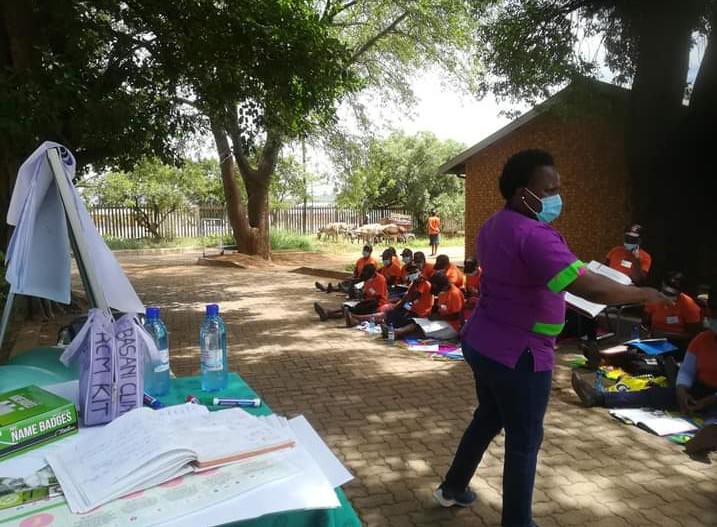
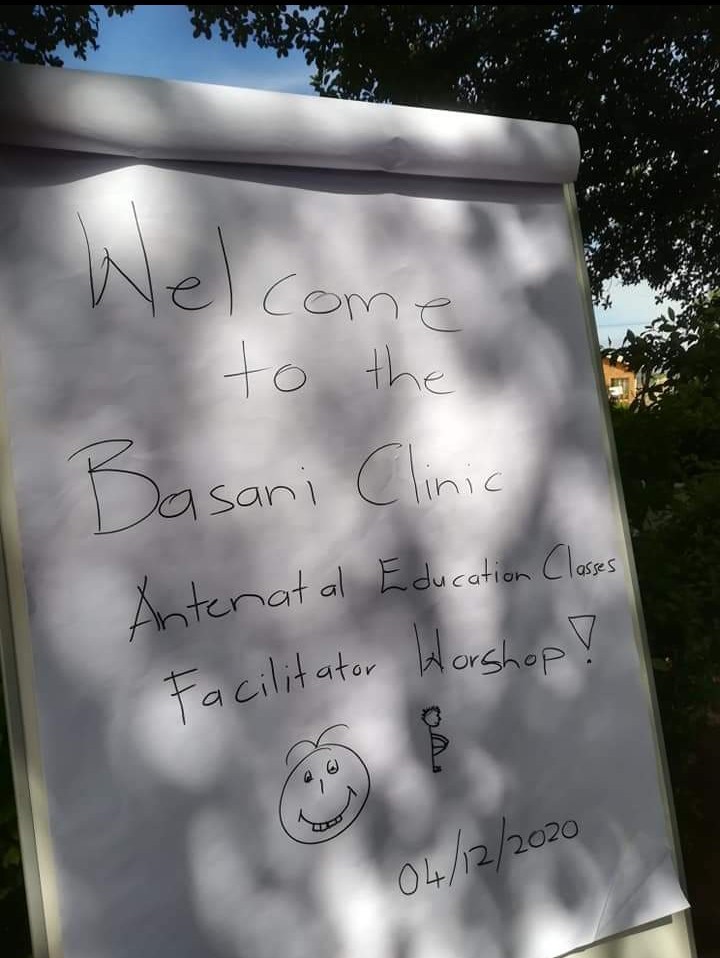
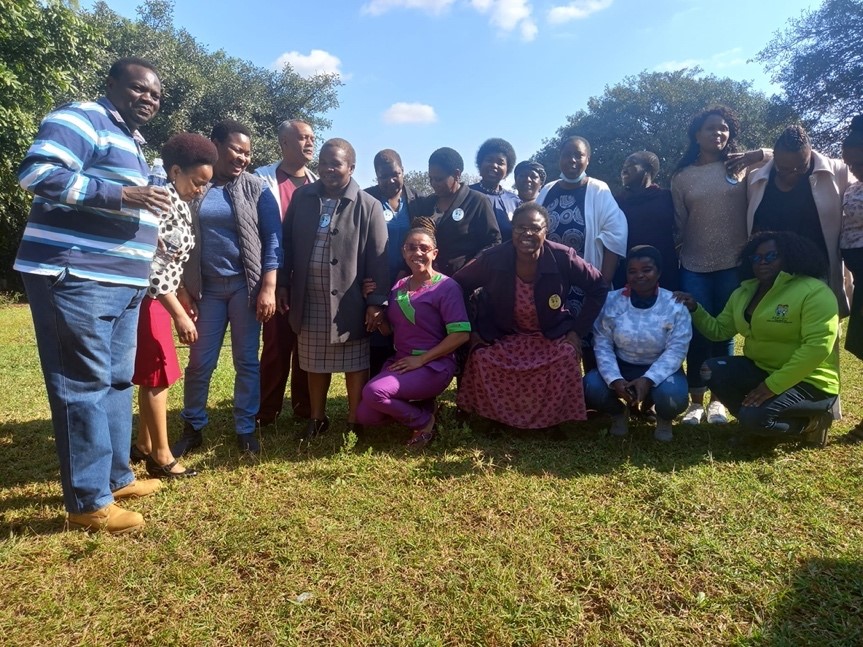
ULT also worked with the province’s district maternal health managers and facility managers to monitor RMC implementation as part of their routine perinatal mortality review meetings. ULT has shared an M&E tool with all RMC Master Trainers to use as is or adapt for their specific settings. Thus far, Capricorn District is the only district that has adopted the tool and started using it to monitor progress in RMC implementation in their facilities (hospitals and clinics) during perinatal review meetings. We will continue supporting the remaining districts to follow suit.
The opportunity to expedite the roll-out of RMC throughout the province availed itself through the Limpopo Department of Health MEC’s Rural Health Matters (RHM) flagship programme. Launching RMC in each district as part of the RHM’s campaign was the order of the day. RMC was launched in Waterberg and Capricorn districts as part of their August and October RHM campaigns in 2022 respectively. Two videos were produced, one from each district, of mothers who had their partners as birth companions to support from labour until birth.
